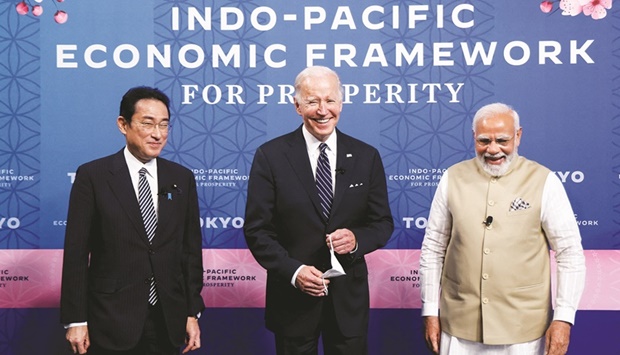The Biden administration announced that a dozen Indo-Pacific countries will join the US in a sweeping economic initiative designed to counter China’s influence in the region, even as questions remain about its effectiveness.
Altogether the nations involved in the Indo-Pacific Economic Framework, or IPEF, constitute roughly 40% of global gross domestic product, according to the White House, which has touted its launch as a marquee accomplishment of President Joe Biden’s first trip to Asia. Australia, India, Japan, South Korea and New Zealand were included, along with seven southeast Asian countries.
“The United States is deeply invested in the Indo-Pacific,” Biden said Monday at an event in Tokyo launching the partnership. “We’re committed for the long haul.”
The framework is the most significant US effort to engage Asia on economic matters since former president Donald Trump in 2017 withdrew from the Trans-Pacific Partnership agreement negotiated under the Obama administration. But unlike that trade deal, the new framework doesn’t include any tariff reductions and it’s unclear which parts are binding, making it hard to quantify the economic benefits.
“This framework is intended to advance resilience, sustainability, inclusiveness, economic growth, fairness, and competitiveness for our economies,” the countries said in a joint statement. “Through this initiative, we aim to contribute to cooperation, stability, prosperity, development, and peace within the region.”
Democrats and Republicans in Congress have questioned the initiative because it doesn’t include a goal of negotiating mutual tariff reductions to make US exports cheaper for consumers in foreign markets, a typical objective of past trade negotiations. Under the framework, participants will be asked to make “high-standard commitments” in at least one of four areas: trade, supply chains, clean energy and fairness.
The four pillars of IPEF
n Connected Economy: Members will implement rules for the digital economy, including standards for cross-border data flows, labour and environmental issues and corporate accountability.
n Resilient Economy: Members will seek commitments that better anticipate and prevent disruptions, including through an early warning system and diversification.
n Clean Economy: Members will pursue targets that tackle climate change, including in the areas of renewable energy, carbon removal and energy efficiency standards.
n Fair Economy: Members will work on effective tax, anti-money laundering and anti-bribery regimes. Asked on Sunday if Congress will need to approve the agreements, US Trade Representative Katherine Tai was non-committal.
“Let’s see where the discussions go, but along the way -- regardless -- we have to keep Congress close and Congress needs to be a part of shaping what we do with our partners here,” Tai said.
At a March Senate hearing, she disagreed with the criticism the IPEF isn’t sufficiently ambitious, saying that it will include innovative elements that people will appreciate with time.
US National Security Adviser Jake Sullivan on Sunday said the 13 founding countries would develop criteria for other members to join, including potentially China.
“I want to be clear that the framework will be open to others who wish to join in the future - if they sign up and meet the goals and work to achieve those goals,” Biden said yesterday.
A senior administration official said the US didn’t invite China to join the framework, partly because it will be based on a set of standards the White House believes Beijing would have a hard time meeting. The US selected the initial group out of a desire to reach beyond countries that have deep economic ties with America, while also ensuring they can agree to at least one of the pillars, the official said.

US President Joe Biden, India’s Prime Minister Narendra Modi and Japan’s Prime Minister Fumio Kishida attend the Indo-Pacific Economic Framework for Prosperity (IPEF) launch event at Izumi Garden Gallery in Tokyo yesterday.
